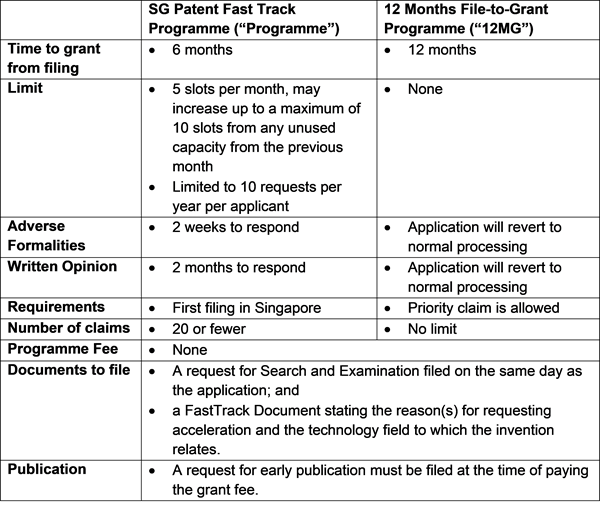The Intellectual Property Office of Singapore (IPOS) has launched the world’s fastest application-to-grant process termed, the SG Patent Fast Track Programme (“the Programme”), under which it may be possible to obtain a patent grant within 6 months from filing an application. Patent applications relating to inventions in any technology field are eligible to use the Programme, which is set to run until 29 April 2022.
The previously launched FinTech Fast Track and Accelerated Initiative for Artificial Intelligence, both of which were respectively targeted only towards FinTech innovations and AI innovations, are now no longer available in view of the launch of the Programme. However, the 12 Months File-to-Grant Programme (“12MG”) is still available and offers a timeline for patent grant within 12 months from filing an application, although the requirements now include submission of a FastTrack Document.
Applicants should note that for applications which claim priority from an earlier filed application, only the 12MG is available. Unfortunately, neither the Programme nor the 12MG apply to divisional applications.
The table below summarizes the main features of the Programme and the 12MG.

The SG Patent Fast Track Programme
Requirements:
To qualify for the Programme, the application must:
- be first-filed in Singapore;
- contain 20 or fewer claims; and
- be within a maximum of 10 applications under the Programme per applicant per year.
The documents required are:
- a request for Search and Examination, filed on the same day as the application; and
- a FastTrack Document stating the reason(s) for requesting acceleration and the technology field to which the invention relates.
While it may be possible to obtain grant much quicker under the Programme, the deadlines for responding to office actions are shorter, as compared to applications under normal processing. For example, a response to an adverse formalities report and a response to a Written Opinion (if one is issued) must respectively be filed within two weeks and two months from the date of the office action. At the time of paying the grant fee, a request for early publication must also be filed.
Practice Pointers
Before deciding whether to accelerate their patent grant, and which programme to use, applicants should consider the issues set out below.
Both the Programme and the 12MG are useful for applicants in the following non-exhaustive scenarios:
- for applications relating to inventions having a short product life cycle and must be commercialized quickly;
- where there is imminent infringement;
- where a granted patent may aid in obtaining a better financial deal; and
- using the patent grant as a starting point to expedite allowance in other countries.
In particular, a Singapore patent can be used to accelerate patent examination in other jurisdictions, for example through the ASEAN Patent Examination Co-operation (ASPEC), Patent Prosecution Highway (PPH)[1], or Global Patent Prosecution Highway (GPPH).
On the other hand, there are advantages in having an application pending as long as possible. For instance, to allow for further revision of the scope of protection since limited amendments can be made post-grant and thus, competitors could only second-guess what might be the eventual patent scope, making it more difficult for them to design around.
Also, the requirement for early publication (as opposed to a publication around 18 months from the filing date of the application) means that there is a shorter time to decide to change IP protection strategy, for example to switch from protecting an invention by means of a patent as opposed to keeping the invention a trade secret.
Thus, for commercially important inventions, one strategy may be to participate in the Programme or 12MG to obtain a quick grant, while also filing a divisional application to keep options open by keeping the divisional application pending.
Another thing to note is that, due to the accelerated nature of the Programme and the 12MG, relevant prior art documents in the form of earlier Singapore patent applications that have not been published at the time the participating application is examined may not be uncovered. It may therefore be necessary to conduct post-grant searches and/or request post-grant amendments to overcome any newly uncovered prior art.
Finally, as there is a cap of five requests per month for the Programme, which are awarded on a first-come-first-serve basis, applicants who wish to utilize the Programme should file their applications as early in the month as possible. Any unutilized requests may be carried forward to the next month, subject to a cap of ten requests per month. If the cap for the month is reached, applications filed under the Programme will automatically be moved to the 12MG, except for those failing to meet formality requirements, which will not be placed under any accelerated processing.
Which one to choose – the Programme or 12MG?
If the applicant decides to accelerate patent grant, the Programme is recommended over the 12MG. The advantage of the Programme over the 12MG is that it offers more flexibility in the sense that a Written Opinion is allowed to be issued without the application falling out of the Programme. However, for the 12MG, if a Written Opinion is issued, the application would fall out of accelerated processing. Also, if an application is considered not to comply with any formality requirements, it would not fall out of the Programme but it would stop being part of the 12MG and revert to normal processing.
[1] Singapore has bilateral PPH agreements with the National Institute of Industry Property Ministry of Economy of Brazil (INPI), the China National Intellectual Property Administration (CNIPA), the Mexican Institute of Industrial Property (IMPI), and the European Patent Office (EPO).

/Passle/6130aaa9400fb30e400b709a/SearchServiceImages/2025-07-03-17-02-32-208-6866b7a81103f79f336d7533.jpg)
/Passle/6130aaa9400fb30e400b709a/SearchServiceImages/2025-07-03-08-08-37-897-68663a85d57f08fe74ee5334.jpg)
/Passle/6130aaa9400fb30e400b709a/SearchServiceImages/2025-07-01-10-00-02-968-6863b1a2bf3898129ef2edb3.jpg)